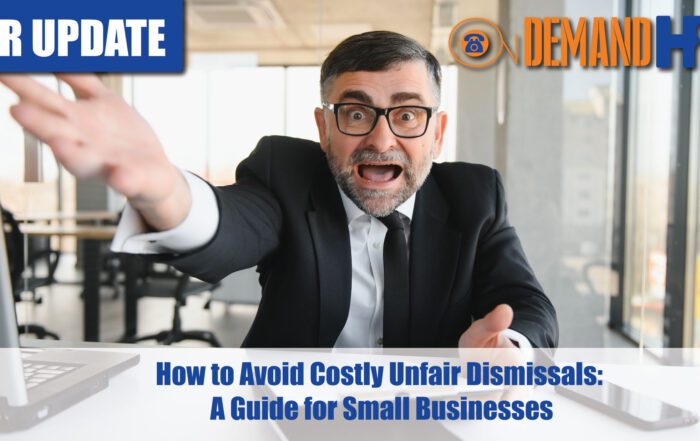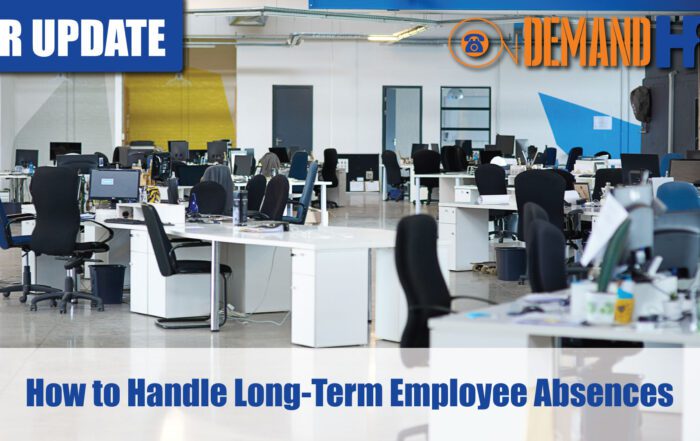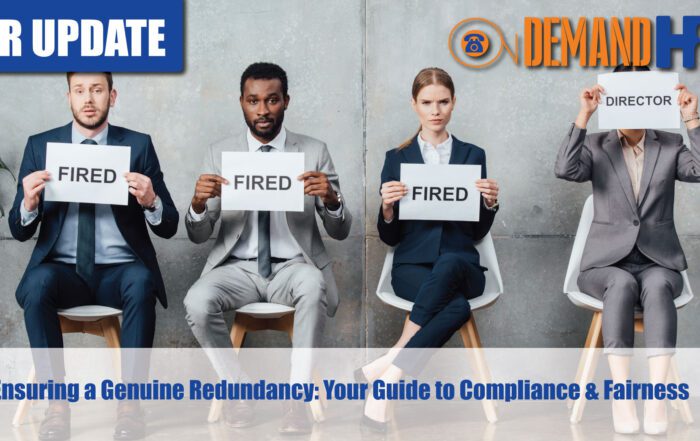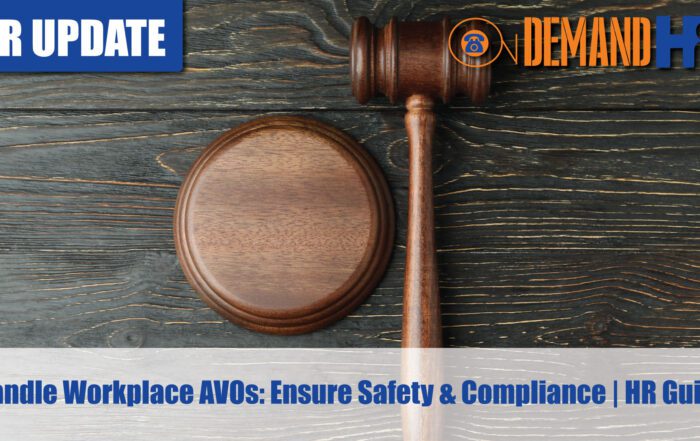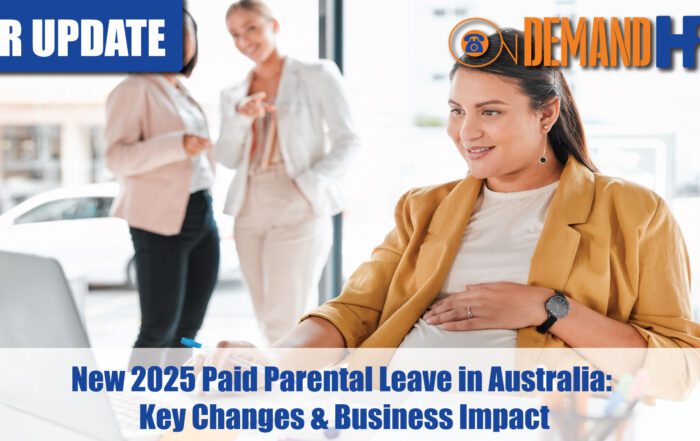Mandatory Workplace Vaccination Considerations
In a recent presenttion ti a groupp of accountants, On Demand HR tackled the topic of mandatory workplace vaccination. We covered the key legislative and regulatory bodies as well as recent cases all of which should have an influence on businesess decision in this space.
Please see below for a full transcript of this video
Share the HR or workplace relations challenge facing your business and one of our experienced consultants will be in touch within 24 hours with a strategic action plan or discover the best strategy yourself by accessing out free online training library.
Transcript
00:00:00:05 – 00:00:21:07
Unknown
I’ll move on to the next part of this, and this is all around workplace mandatory vaccination. So as I alluded to in my last couple of slides, there’s been four industries where it’s been mandated being aged care, health, education and quarantine hotels and obviously temporarily all of those other industries that are there.
00:00:21:08 – 00:00:42:07
Unknown
But what I want to talk about now really is is is mandatory vaccination on an ongoing basis. And I guess, look, there’s a few things to consider here. And one of the things that the certainly that safe work and the Fair Work Ombudsman seem to talk about in particular is the sort of risk of infection.
00:00:42:07 – 00:00:57:21
Unknown
So the question mark for me is going to be as at December the first. I think I think the best way to look at this is December the first onwards, because at the moment we’ve got temporary orders and temporary orders should not be confused with permanent requirements.
00:00:58:05 – 00:01:12:02
Unknown
So I think the best way to look at this is from December first onwards. And what I would say is that looking at this I mean, first of all, there’s no guarantee that in December will necessarily have very high case numbers.
00:01:12:20 – 00:01:29:05
Unknown
If you want to use that as a yardstick for, you know, how much infection there is. I mean, the case, numbers seem to be trending down at the moment. And that’s probably, I mean, at least some sort of barometer as to how much infection there is out there.
00:01:29:05 – 00:01:44:11
Unknown
So whether you can enforce a mandatory vaccination policy beyond that is probably going to be based. It could potentially be based on that’s one factor, certainly how much infection is actually around. Obviously, a look last week we had the New South Wales Supreme Court decision.
00:01:44:11 – 00:02:01:17
Unknown
I’m just going to go through all these bubbles because these are all kind of there’s some things that go, here sort of that kind of support the notion, some things that go against the notion. But the one thing, one thing, just just to be clear, is you’ve got so many bodies out there that have a view about
00:02:01:17 – 00:02:24:08
Unknown
workplace mandatory vaccination. And just to be clear, what we’re talking about, we’ve got we’re talking about workplace mandatory vaccination decisions above and beyond the requirements of the health orders. And what’s important to put in context as we go through these bubbles is you’ve got both state based organization and federal bodies who all have a different view who
00:02:24:09 – 00:02:40:05
Unknown
all impact on the workplace. So, you know, if one particular body says, Hey, for example, safe work says, it’s ok, not saying they are, but they say it’s okay to implement a workplace mandatory vaccination and someone doesn’t get vaccinated and they get terminated.
00:02:40:16 – 00:03:01:04
Unknown
Well, then you’ve got to deal with the Fair Work Commission. So all of these things are integrated. It’s not simple, yes or no answer? Yeah. So look, the Supreme Court decision last week, I would encourage you to turn off your media outlets when reporting on that because they’ll report it as a massive how do I put this?
00:03:01:07 – 00:03:16:06
Unknown
that, you know, it’s all over red rover and that mandatory vaccination is okay? Well, that’s that’s certainly not the case. The the Supreme Court decision went to two specific industries and went to largely the temporary health orders, which actually already expired.
00:03:16:11 – 00:03:32:16
Unknown
So the case was about the construction and restrictions at the time and was also about the LGA restrictions at the time. And I believe it also covered Andrew it covered a couple of other industries it covered education and one other.
00:03:33:00 – 00:03:49:01
Unknown
Well, those were the applicants, but the main thing that it is really looking at is two things did Hazard have the ability to make the health orders that he did make? Did he have the legal right to do so?
00:03:49:09 – 00:04:09:01
Unknown
And second, the second thing is, looked at is whether or not the removal of someone’s ability to go to work as a as a result of restriction of movement did that in effect, equate to mandatory vaccination or as the government tried to spin it
00:04:09:09 – 00:04:29:20
Unknown
Is it more about incentive? Yeah. So, yes, I think the main part of the Supreme Court decision went to health orders that actually were expired, so if you look at it from the applicant’s point of view, AFL solicitors and those other applicants who took it, well, the case may not have succeeded.
00:04:30:09 – 00:04:43:04
Unknown
But what they did succeed in doing is getting the government to drop the drop the old orders because the orders as of the Monday, the 11th of October were nothing like the previous ones. So it’s a very interesting case when you look at it from that perspective.
00:04:43:24 – 00:05:00:03
Unknown
Let’s go to the Fair Work Ombudsman. But just one more, just one more point on that. The biggest message to take out of this is, again, it was tested on the health orders. It was not in relation to an individual business making a determination on mandatory vaccination above and beyond what the health orders require.
00:05:00:04 – 00:05:16:14
Unknown
So there’s no application for individual businesses, and we’ve heard from multiple levels of government across this pandemic. Well, whether or not they require their employees to get vaccinated, the choice for business. So the point being is this case in the Supreme Court has nothing to do to influence that.
00:05:17:06 – 00:05:36:02
Unknown
Yes, the Fair Work Ombudsman have said that what their position on this is at the moment is that in some cases, employers may be able to require their employees to be vaccinated against COVID 19. Employers should exercise caution if they are considering making mandatory 19 COVID 19 vaccinations mandatory in their workplace and get their own legal
00:05:36:02 – 00:05:56:15
Unknown
advice. So that’s what they are saying. SafeWork New South Wales is saying consideration must be given the legal implications of workplace vaccination mandates, including workplace relations, privacy anti discrimination laws. We don’t have any cases in the Fair Work Commission yet that have gone specifically to the case of COVID 19 vaccination.
00:05:56:22 – 00:06:13:13
Unknown
There is a couple that went to flu vaccinations from last year, so again, no Fair Work Commission decision. I’ll get to Deputy President Dean in a minute, because that’s very interesting. Discrimination laws and Australian Human Rights Commission, no cases there yet, so that’s untested.
00:06:14:14 – 00:06:37:19
Unknown
The Fair Work Act. I guess what some employers are going to try and run with is that mandatory vaccination is a reasonable workplace directive now. Whether that’s the case or not is going to depend on the circumstances. And I’ve certainly I’ve had some contact with some clients and I think that in some situations I feel that their
00:06:37:19 – 00:06:54:11
Unknown
kind of decisions or wanting to go to mandatory vaccinations, I feel is probably a bridge too far. I just think there has been some industries, which is just not, I don’t think have the ability to make those those positions, but they are either ruuning with them or they don’t I think you’ll find a lot of a lot of businesses
00:06:54:11 – 00:07:11:08
Unknown
will have a strong view on this one way or another. So you can only guide so much. But obviously a lot of these businesses will take their own decisions just before you go on. The other thing that I think that we’ve seen a lot of questions and what’s creating a challenge for a lot of our clients is
00:07:11:15 – 00:07:31:02
Unknown
, for example, a client may look at something like this and say, Hey, look on the balance. Maybe I should not mandate workplace vaccinations for my business. But the challenge that they’re facing is, well, let’s say they’ve got a transport business and they send out their drivers out to deliver goods.
00:07:31:10 – 00:07:51:18
Unknown
If the workplace that they’re going to has that same decision has a flow on effect back to your business, and that’s a real challenging one. Yeah. So I’m going to go quickly to Deputy President Dean. So what Deputy President Dean did that was recently a case it was Kimble versus can’t remember the business name, but basically what
00:07:51:18 – 00:08:11:19
Unknown
happened there was, I think, sorry, Sapphire .Thanks, mate. And basically Kimble V Sapphire. So all in the first decision, this particular business Sapphire implemented a flu vaccination mandatory policy in 2020. This Kimble was terminated because she did not get a flu vaccination.
00:08:12:03 – 00:08:23:24
Unknown
The matter went to the Fair Work Commission. The initial decision was that the termination was fair and reasonable. She worked in a child care facility. Is that right, Andrew? I think it was aged care.
00:08:24:00 – 00:08:41:13
Unknown
Aged care. Sorry, I’m one of those, two I can’t quite remember what it was, but but basically what then happened was that the case went on appeal to the Fair Work Commission, and when it goes on appeal, the full bench decides whether or not to hear the appeal.
00:08:41:17 – 00:09:01:12
Unknown
Now in this situation, it was three commissioners, two voted in favor of of basically two voted against the appeal and one voted in favor of the appeal. So the appeal didn’t didn’t materialize. It was 2-1 against. But what was very significant was what was said by the one against in that particular decision.
00:09:01:12 – 00:09:23:07
Unknown
And Deputy President Dean went on to say quite a lot of things about it, and one of the things the deputy president Dean did say is that. And whether you agree with it or not, deputy president Dean said that mandatory vaccination was in actual fact a very lazy way of actually managing risk of COVID 19 in
00:09:23:07 – 00:09:46:08
Unknown
the workplace. And her argument was that, well, workplace testing, regardless of vaccination status, is a much better risk mitigation position. She went on to talk about a whole range of other things, but effectively she argued that look that by having, you know, mandatory vaccination rules, it was coercion and went against human rights.
00:09:46:08 – 00:10:01:00
Unknown
And it was a whole bunch of other things that Deputy President Dean said. But what our take out of that was is that if you go to the Fair Work Commission with a case, well, do you really want to be gambling on what commissioner that you get on the day?
00:10:01:05 – 00:10:12:16
Unknown
I mean, if deputy president Dean is against it, well, then it’s probably going to be others that are going to be against it as well. So really, if you’re in those four industries, well, OK, you’re bound by the government’s health orders.
00:10:12:16 – 00:10:28:23
Unknown
But if you’re not well, then you want to be really careful looking at a mandatory vaccination policy because if if effectively, as a result of that, you bring someone’s employment to a head and terminate the employment, well, then that’s where you might end up in the commission.
00:10:29:07 – 00:10:47:18
Unknown
So and it probably does go to the point of workplace testing, and there is probably not enough discussion about this, I think that businesses are looking at. I think I think some businesses are looking at mandatory vaccination as a kind of a I don’t want to say it’s an easy way out, but a bit
00:10:47:18 – 00:11:09:06
Unknown
of a bit of a, you know, a bit of a one, a bit of a one off kind of approach. And as you probably would all know, I mean, transmission still occurs, obviously regardless of vaccination. So I guess you can make the argument that testing is actually much more effective in terms of now.
00:11:09:07 – 00:11:19:11
Unknown
Do you want to implement testing? That’s another thing because that’s that’s not easy on it in and of itself. You really got to consider rapid antigen testing or you’ve got to consider having people test at a facility once a week.
00:11:19:11 – 00:11:34:02
Unknown
Is that inconvenient? You know how are staff going to respond to that. But the reality is, if you are really worried about COVID 19, if you really and if you’re really concerned about managing the risks, well, then you might have to think about things like that because.
00:11:34:10 – 00:11:51:19
Unknown
And I think by December one will probably have a pretty good idea of where things are at, what we’ve ultimately been saying to our clients now for some time, which is probably being a little bit against the grain of what others have said is we’ve just said to follow the health orders and and really no more.
00:11:51:19 – 00:12:05:14
Unknown
We don’t see that there’s a great argument at this point, for mandating vaccinations based on all of the unknowns. I mean, there’s so many unknowns in that. In that picture we presented there, there is so many unknowns.

